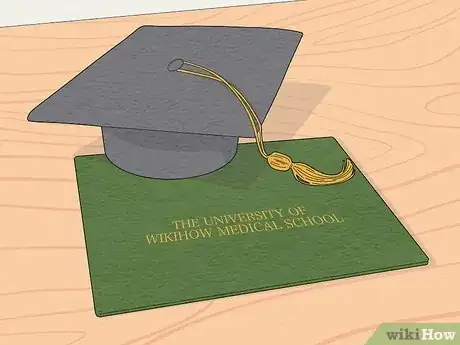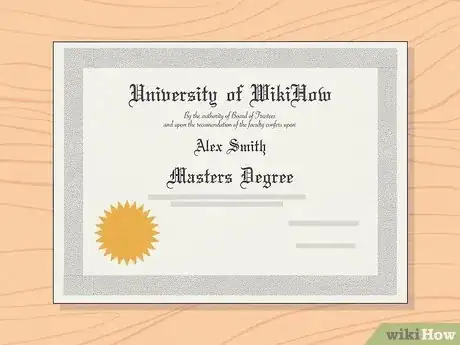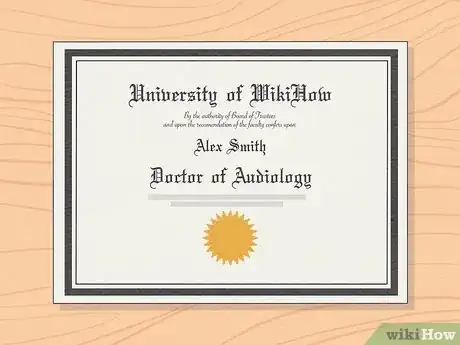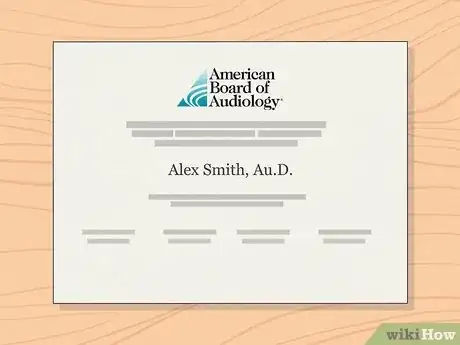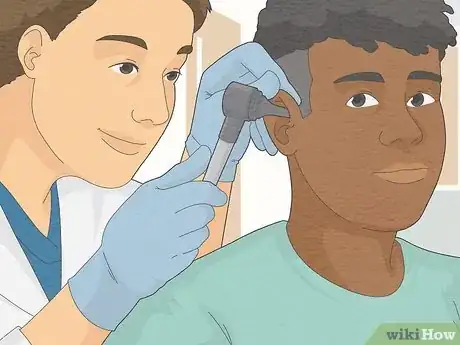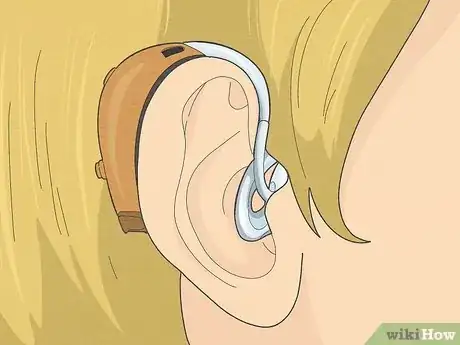This article was co-authored by wikiHow staff writer, Jennifer Mueller, JD. Jennifer Mueller is a wikiHow Content Creator. She specializes in reviewing, fact-checking, and evaluating wikiHow's content to ensure thoroughness and accuracy. Jennifer holds a JD from Indiana University Maurer School of Law in 2006.
There are 10 references cited in this article, which can be found at the bottom of the page.
This article has been viewed 8,747 times.
Learn more...
If you love working with sound and want to help people get the most out of their hearing, maybe you would enjoy a career as an audiologist! These healthcare professionals, who diagnose and treat hearing and balance conditions, are in high demand in the US and around the world. Read on to find out what you need to do to start a fulfilling career in audiology.
Things You Should Know
- Earn a bachelor's degree followed by a doctorate in audiology (AuD) to become an audiologist.
- Pass the Praxis exam after you graduate from your doctoral program to get licensed in the state where you want to work.
- Join professional associations and get optional certifications to increase your chances of landing the position you want.
- Expect to make around $78,950 a year as an audiologist, depending on your work environment and where you're located.
Steps
Education
-
1Bachelor's degree All audiology programs require students to have a bachelor's degree prior to enrollment in the program. It doesn't matter what you major in, but most audiologists major in something related to audiology, such as speech-language pathology or biology.[1] X Trustworthy Source US Bureau of Labor Statistics U.S. government agency that collects and reports labor-related information Go to source
- While you're in undergrad, it's a good idea to take courses in anatomy, physiology, and statistics. These courses provide a foundation of knowledge that will serve you well in your audiology program.
-
2Master's degree (optional) While a master's degree isn't required prior to getting your doctorate in audiology, it can be beneficial and help you stand out from other audiologists. A master's degree in speech-language pathology also provides you with some clinical experience before you start your doctorate.[2] X Research source
- If you're planning on taking some time to work before you get your doctorate, a master's is also a good choice because you would have the ability to work as a speech-language pathologist, earning valuable experience in the field.
Advertisement -
3Doctoral degree (AuD or Ph.D.) The doctorate in audiology program is designed to take 4 years and you can enter straight from undergrad. The first 2 years include foundational courses in acoustics, aural rehabilitation, hearing problems, and balance disorders. You'll also learn how to test hearing and amplify sound as well as how to diagnose and treat various hearing and balance disorders. The last 2 years are primarily devoted to research and clinical work.[3] X Research source
- The American Speech-Language Hearing Association publishes a list of accredited audiology programs in the US. The list includes a website link and contact information for each program.
-
4Clinical externship Your clinical externship takes up the last year of your doctoral program and gives you the opportunity to apply what you've learned in a clinical setting with real patients. You'll typically start applying in your third year to land a choice position. If you want to specialize, it's important to find an externship that focuses on that specialty.[4] X Research source
- For example, if you want to work with kids, you might look for an externship at a school or a children's hospital.
- The competition for some externships can be quite stiff, but your school has a lot of resources to help you get the most out of the application and interview process so you can find the externship that best suits your needs and interests.
- Externships aren't paying positions, nor do they qualify as "experience" for your résumé. Rather, they're required to get your doctoral degree.
Licensure and Certification
-
1Praxis exam The Praxis exam, provided by Educational Testing Service (ETS), tests your knowledge in 5 categories: foundations of audiology, prevention and screening, assessment, intervention, and professional and ethical responsibilities. You'll learn more about the specifics of the exam through your audiology program, including where to access study materials and how to register.[5] X Research source
- The specific score you need to pass varies depending on the state where you want to practice. The American Academy of Audiology provides a list of state regulations you can use to compare requirements.
-
2State licensure An AuD or Ph.D. and a passing score on the Praxis exam are the main requirements for state licensure. Each state has its own application process and timeline for issuing licenses, but generally, you can start the process immediately after you graduate.[6] X Research source
- The American Speech-Language-Hearing Association provides contact information for each state's licensing board.
-
3Optional certifications No state requires any additional certifications beyond the basic state license, but they can help you stand out and show your expertise in a particular specialty, such as pediatrics or cochlear implants. Some employers will also pay audiologists with certifications a little more.[7] X Trustworthy Source US Bureau of Labor Statistics U.S. government agency that collects and reports labor-related information Go to source
- Certifications are offered by the American Speech-Language-Hearing Association and the American Board of Audiology.
Job Duties
-
1Diagnose hearing, balance, and related disorders. Audiologists review the case history of patients and conduct hearing tests and other screenings to diagnose or rule out specific disorders related to the auditory system. They might also refer patients to other specialists for additional testing.[8] X Research source
- Some of the tests audiologists administer are designed to measure the patient's functional hearing as well as assess any nerve damage.
- Audiologists might have technicians to administer the specific tests, but they're ultimately responsible for interpreting the results and making the diagnosis.
-
2Treat hearing, balance, and related disorders. This includes fitting patients with hearing aids and other assistive devices and teaching patients how to operate those devices. It could also include other treatments, such as cleaning ear wax from the patient's ears.[9] X Trustworthy Source US Bureau of Labor Statistics U.S. government agency that collects and reports labor-related information Go to source
- Audiologists can't prescribe medications to treat hearing or balance issues, but they can refer patients to other specialists. They can recommend over-the-counter medications that might help relieve the patient's symptoms.
- If the patient potentially needs surgery to correct their hearing or balance problems, an audiologist refers them to an ear, nose, and throat (ENT) surgeon. Audiologists don't perform surgeries themselves.
-
3Educate and counsel patients. In this role, the audiologist tells patients about things they can do to prevent further hearing loss and offers advice that can help them cope with existing hearing loss. Audiologists also talk to family members about ways they can communicate with the patient.[10] X Trustworthy Source US Bureau of Labor Statistics U.S. government agency that collects and reports labor-related information Go to source
- In cases of severe hearing loss, audiologists might also coach patients on lip reading or the use of other assistive technology.
Salary and Job Outlook
-
1Audiologists in the US earn around $78,950 a year. Your income depends to some extent on your location as well as your work environment: hospitals tend to pay more ($94,690) than private physicians' offices ($78,070). The longer you work in the field, the more you can expect to earn.[11] X Trustworthy Source US Bureau of Labor Statistics U.S. government agency that collects and reports labor-related information Go to source
- Most audiologists work full-time, but there are also part-time and contract audiologists. Contract audiologists typically work at several different facilities, so they spend a good deal of time traveling.
-
2Employment of audiologists is expected to grow 10% from 2021-2031. The Bureau of Labor Statistics (BLS) makes this projection in part based on the aging baby-boom population. However, audiologists are expected to grow at a faster rate than healthcare positions generally (9%) and twice as fast as all occupations (5%).[12] X Trustworthy Source US Bureau of Labor Statistics U.S. government agency that collects and reports labor-related information Go to source
- If you're just thinking about a career in audiology and still have 8-10 years of school to finish, this is good news for you. By the time you graduate, the career will still be in high demand. You've picked a good time to get started!
Warnings
- This article focuses on audiology careers in the US. If you live in another country, the education and licensing requirements might be different.⧼thumbs_response⧽
You Might Also Like














References
- ↑ https://www.bls.gov/ooh/healthcare/audiologists.htm#tab-4
- ↑ https://www.unt.edu/academics/grad/audiology-speech-language-pathology
- ↑ https://saa.audiology.org/education-2/undergraduate-programs/applying-to-audiology-graduate-school/
- ↑ https://saa.audiology.org/career-resources/externships/
- ↑ https://saa.audiology.org/externship-blog-series-studying-for-the-praxis/
- ↑ https://www.asha.org/advocacy/state/
- ↑ https://www.bls.gov/ooh/healthcare/audiologists.htm#tab-4
- ↑ https://www.asha.org/policy/SP2018-00353/
- ↑ https://www.bls.gov/ooh/healthcare/audiologists.htm#tab-2
About This Article

